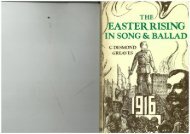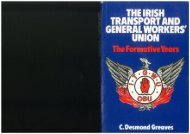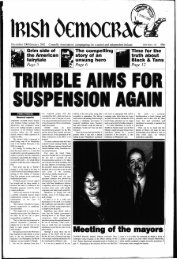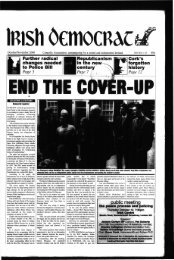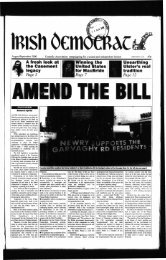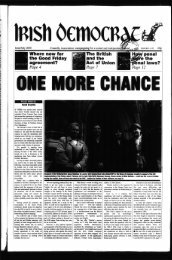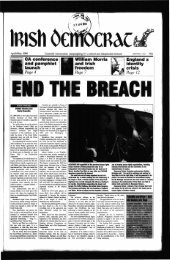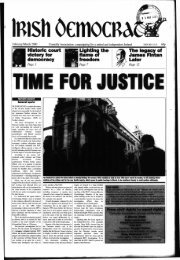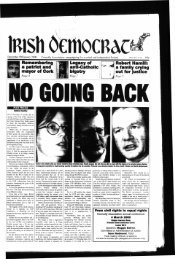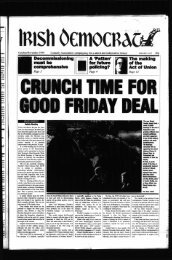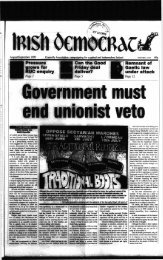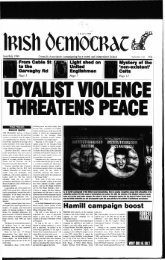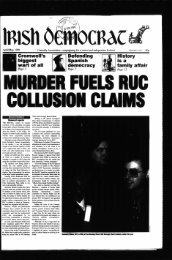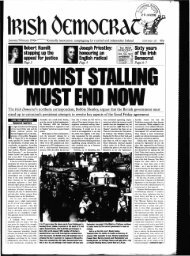You also want an ePaper? Increase the reach of your titles
YUMPU automatically turns print PDFs into web optimized ePapers that Google loves.
1 \\<br />
IRISH<br />
BOOKS<br />
The most unmanageable<br />
revolutionary<br />
LIZ CURTIS<br />
The Gonne-Yeats Letters<br />
1893-1938: Always Your<br />
Friend. Edited by Anna<br />
MacBride White and<br />
A.Norman Jeffares.<br />
Pimblico, £12.50, pbk.<br />
This is a doorstopper of a<br />
book, more than 500<br />
hundred pages long, a<br />
real treat for admirers of Maud<br />
Gonne, and a must for students<br />
of the <strong>Irish</strong> cultural and<br />
political revival at the turn of<br />
the century.<br />
Maud Gonne, known as<br />
"Ireland's Joan of Arc," was<br />
born in 1866 and in her late<br />
twenties became one of the<br />
most charismatic figures in<br />
<strong>Irish</strong> political life, campaigning<br />
first for evicted tenants in<br />
Donegal, then for "treasonfelony<br />
prisoners" held in<br />
Britain's bleak Portland jail.<br />
She ran a political paper, L'-<br />
Irlande Libre, in France, and lectured<br />
widely on <strong>Irish</strong> affairs.<br />
Six foot tall, she was a<br />
woman of remarkable beauty<br />
who attached little importance<br />
to her looks, and had a lifelong<br />
instinctive concern for the<br />
poor and those in distress.<br />
Trapped in France in the First<br />
World War, she nursed<br />
wounded soldiers. She hated<br />
the war, and feared such work<br />
might encourage it, but wrote<br />
to Yeats, "& yet, & yet, one<br />
cannot remain with hands<br />
folded before suffering."<br />
The daughter of an English<br />
army officer of <strong>Irish</strong> descent,<br />
she had an independent income<br />
which she spent<br />
generously on the <strong>Irish</strong> cause,<br />
and which allowed her to<br />
employ various people to<br />
maintain her household.<br />
FOUR PROVINCES<br />
BOOKSHOP<br />
is open at:<br />
244 Grays Inn Road,<br />
London WC1X 8JR<br />
Tuesday to<br />
11am to 4pm<br />
Saturday<br />
A wide range of books, periodicals<br />
and pamphlets of<br />
<strong>Irish</strong> interest available.<br />
Also for sale:<br />
The Wolfe Tone Mug<br />
price £3 p&p add 80p<br />
Views expressed by book<br />
reviewers are not necessarily<br />
those of the editorial committee<br />
of the <strong>Irish</strong> <strong>Democrat</strong>.<br />
The letters in this book<br />
are almost all from Gonne to<br />
Yeats. His to her were, according<br />
to the dust-jacket,<br />
"destroyed by the Free Staters<br />
when they ransacked her<br />
Dublin home."<br />
Writing in the midst of a<br />
busy life, she frequently signs<br />
off with the words "in great<br />
haste." She is chatty, gentle<br />
and modest: she laments that<br />
her letters "say so little of what<br />
one means," while his "are always<br />
interesting and beautiful<br />
though sometimes they make<br />
me very sad." She talks of her<br />
lecture tours, of her travels, of<br />
her spells of ill-health, and<br />
often of her pride in her<br />
children.<br />
The letters are marred<br />
only by a trace of anti-Semitism,<br />
all too common in the<br />
period and shared by Yeats,<br />
stereotyping Jews as grasping<br />
financiers.<br />
Despite Gonne's<br />
reticence about personal matters,<br />
the letters reveal much<br />
about her relationship with<br />
Yeats. She appreciates his<br />
friendship: "such a charming<br />
restful thing," thanks him for<br />
the poems he often sends<br />
which are invariably "beautiful,"<br />
and encourages his writing<br />
. She takes a lively delight<br />
in demonstrations against the<br />
authorities, and sees his role as<br />
different: "You have a higher<br />
work to do - With me it is different.<br />
I was born in the midst<br />
of a crowd." As time passes,<br />
his elitism contrasts more and<br />
more sharply with her<br />
democratic instincts.<br />
Gonne chats matter-offactly<br />
about their occult experiments:<br />
"1 will come & have<br />
tea with you & we will try and<br />
get some visions but I will not<br />
be in London more than a day<br />
or two as I ought to have been<br />
in Paris 10 days ago." The turn<br />
of the century was a time of<br />
ferment sometimes likened to<br />
the 1960s, and occultism was<br />
common among intellectuals,<br />
who were seeking alternatives<br />
to the established religions.<br />
Yeats and Gonne, with their<br />
interest in <strong>Irish</strong> nationalism,<br />
invoked beings from Celtic<br />
mythology, such as sun god<br />
Lug and the goddess Brighid.<br />
The letters also give<br />
glimpses of how Gonne tactfully<br />
tried to discourage<br />
Yeats's passion for her. "Your<br />
letter distressed me a good<br />
deal -1 don't want you to give<br />
me so much place in your life,"<br />
she tells him in 1897. At thi:<br />
time she was having a secre:<br />
love affair with Lucien Millevoye,<br />
a French right-wing<br />
revolutionary, who was married.<br />
She had two children<br />
with him: a son, Georges, who,<br />
to her great distress died aged<br />
17 months, and a daughter,<br />
Iseult, whom she pretended<br />
was her niece. In December<br />
1898 Yeats and Gonne had<br />
simultaneous dreams that<br />
they had kissed one another.<br />
But Gonne once again told<br />
Yeats she could not marry him,<br />
and went to confess the story<br />
of her relationship with Millevoye.<br />
Millevoye left her for a<br />
singer, and Gonne continued<br />
to have difficulty - as did other<br />
prominent women activists of<br />
the time - in forming satisfactory<br />
domestic relationships<br />
with men. Perhaps the most<br />
distressing section of the book<br />
concerns her brief marriage to<br />
John MacBride.<br />
Her husband was a hero<br />
of the <strong>Irish</strong> Brigade that fought<br />
for the Boers against Britain in<br />
the South African War. In<br />
1902, aged 35, she wrote to her<br />
sister: "I am getting old and oh<br />
so tired and I have found a<br />
man who has a stronger will<br />
than myself and who at the<br />
same time is thoroughly<br />
honourable and who I trust."<br />
In 1903, despite warnings<br />
from their friends and<br />
families, they married, and<br />
Gonne's disillusionment was<br />
rapid.<br />
MacBride proved to be an<br />
inveterate drunkard, causing<br />
embarrassing public scenes,<br />
but worse was to come. In<br />
19C4 Gonne was told by<br />
several members of her<br />
household in Paris that he had<br />
behaved indecently towards<br />
them while drunk - even terrifying<br />
10-year-old Iseult in<br />
this way - and had committed<br />
adultery with her seventeenyear-old<br />
half sister. A long<br />
and bitter divorce case followed,<br />
as Gonne desperately<br />
tried to ensure that MacBride<br />
would not get access to their<br />
baby son Sean. It was not until<br />
after he was executed following<br />
the Easter Rising of 1916<br />
that she could safely return to<br />
Ireland. His execution partly<br />
redeemed him In Gonne's<br />
eyes: "Major MacBride by his<br />
death has left a name for Sean<br />
to be proud of," she wrote to<br />
Yeats.<br />
At the height of the Black<br />
and Tan terror in 1920 she told<br />
Yeats he should not keep his<br />
distance from the conflict,<br />
reminding him of "the unspeakable<br />
warfare being carried<br />
on by Government orders<br />
by the most debased riff-raff<br />
from English jails & wardrunk<br />
soldiers & officers,<br />
these torturings of prisoners,<br />
these floggings and & shootings<br />
of unarmed men & burning<br />
of homes of women &<br />
children."<br />
After the establishment<br />
of the Free State in 1922,<br />
Gonne's and Yeats's political<br />
paths diverged even further,<br />
and their letters became much<br />
fewer, with her reprimanding<br />
him for voting in the Senate<br />
for repressive laws. More of<br />
Yeats's letters from this last<br />
period survive, and his final<br />
one, written five months<br />
before his death in January<br />
1939, he invites her to tea and<br />
ends with the words, "I have<br />
wanted to see you for a long<br />
time, but -."<br />
Most of the biographical<br />
material came from Margaret<br />
Ward's book, (reviewed on<br />
the right.)<br />
Old analyses, same problems<br />
Alex Reid<br />
The Communists and the<br />
<strong>Irish</strong> Revolution. Part One.<br />
The<br />
Russian<br />
Revolutionaries on the <strong>Irish</strong><br />
National Question,<br />
1899-1924. Edited by D.R.<br />
O 'Connor Lysaght.<br />
Litereire Publishers, Dublin.<br />
£7.99pbk.<br />
This is the first complete<br />
collection of source texts<br />
on the issue, according to<br />
O'Connor Lysaght. He has<br />
brought together essays, letters,<br />
newspaper articles and<br />
selections from all the important<br />
figures of the Bolshevik<br />
revolution including Lenin,<br />
Trotsky and Stalin as well as<br />
statements from the Communist<br />
International.<br />
Marx and Engels<br />
believed that social struggle in<br />
Ireland would directly affect<br />
the the advances of socialism<br />
in Britain. Marx wrote in an<br />
American newspaper:<br />
"The English working class<br />
will never accomplish anything<br />
until it has got rid of<br />
Ireland."<br />
Lenin, whose writings take<br />
up the greater part of this book,<br />
uses this quotation when clearing<br />
up the misunderstanding<br />
of Marx's position on the national<br />
question. There were<br />
those, Rosa Luxemburg<br />
among them, who argued that<br />
national self-determination<br />
was economically impossible<br />
and who interpreted Marx as<br />
saying that the national struggle<br />
should always be subordinated<br />
to the class struggle.<br />
Maud, Sean and Iseult Gonne.<br />
A long campaigning life<br />
Maud Gonne, A Life by<br />
Margaret Ward. Pbk. £8.40.<br />
Published by Pandora.<br />
Ms Ward's stated aim in a<br />
boqklet, was to put <strong>Irish</strong><br />
women into <strong>Irish</strong> history,<br />
as both traditional and<br />
revisionist historians had ignored<br />
their role.<br />
The writer choose Maud<br />
Gonne rather than, say,<br />
Markievicz, Sheehy Skeffington<br />
or Despard, because Maud's active<br />
political life dated from<br />
1885 to 1953, whereas the others<br />
started their public activities<br />
later and died earlier.<br />
Maud's first political activities<br />
were at meetings in<br />
Mayo when the Ladies' Land<br />
League were building cabins to<br />
house evicted families This was<br />
when the male leaders of the<br />
Land League were all in jail and<br />
Maud was addressing large<br />
meetings denouncing the<br />
landlords and the government.<br />
Lenin, on the other hand,<br />
consistently shows the importance<br />
of linking the fight for<br />
national independence and<br />
the struggle for economic<br />
emancipation.<br />
Stalin debates with two<br />
leading social democrats who<br />
tell us that every national<br />
movement is a reactionary<br />
movement: "That is not true,<br />
Comrades. Is not the <strong>Irish</strong><br />
movement against British Imperialism<br />
a democratic movement<br />
which is striking a blow<br />
against imperialism?<br />
The Bolsheviks' understanding<br />
of the situation in<br />
Ireland and of Britain's role at<br />
the time is quite striking. The<br />
Dublin Lock-out, the Easter<br />
Rising, rural develop nent, the<br />
Home Rule Bill and the British<br />
governments subsequent surrender<br />
to the Unionists are all<br />
given careful consideration.<br />
Lenin reminds us:<br />
"Socialists must explain to the<br />
masses that the English<br />
socialist who fails to struggle<br />
as part of his work, for the<br />
freedom to secede for Ireland .<br />
. . is a socialist and internationalist<br />
only in name, but a<br />
chauvinist and an annexationist<br />
in fact."<br />
Her charismatic personality ensured<br />
large audiences.<br />
Maud's politics were like<br />
that of ordinary working<br />
people, based on everyday life<br />
rather than theory. Her eclectic<br />
brand of nationalism meant she'<br />
was willing to make alliances<br />
with anyone who was actually<br />
doing something about poverty,<br />
political prisoners or <strong>Irish</strong>'<br />
freedom. So she worked at one<br />
time with Griffith and, later,<br />
with Connolly.<br />
After the treaty she supported<br />
the pro-treatyites until<br />
the death of Griffith and Collins.<br />
From then on she was in<br />
the forefront of opposition to<br />
the Free State. Both Charlotte<br />
Despard and Maude helped<br />
Roddy Connolly to set up the<br />
Workers' Party of Ireland.<br />
I leave readers to discover<br />
for themselves the details of the<br />
many other political campaigns<br />
Maud Gonne took a leading<br />
part in.<br />
G.C.<br />
In his introduction, the<br />
editor offers some criticism,<br />
not altogether unjustified, of<br />
the lack of political action undertaken<br />
by the Communist<br />
Party of Great Britain on the<br />
issue of Ireland. Personal experience<br />
illustrates that still<br />
today there are those in the<br />
communist movement in<br />
Britain who tend to leave the<br />
political work of campaigning<br />
for British disengagement<br />
from Ireland to their <strong>Irish</strong> comrades<br />
or to those who know<br />
about the issue.<br />
O'Connor Lysaght should<br />
be congratulated in bringing<br />
this collection together, an invaluable<br />
reference book and<br />
guide to action.<br />
onnolly<br />
IR<br />
raff<br />
James Connolly was the last of the Easter Rising leaders to<br />
be executed. Gravely wounded in the fighting at the GPO,<br />
he was taken on a stretcher to the execution yard at Kilmainham<br />
jail at dawn on May 12th, 1916, strapped to a chair and shot<br />
by a firing squad. Arthur Murnaghan and Charles Carroll, both<br />
of the Royal Dublin Fusileers, took care of Connolly's body after<br />
the execution. Mumaghan later told his sister that Connolly<br />
took the spindle of the chair with him, so great was his death<br />
struggle. They were both killed in France in 1917.<br />
The man was all shot through that came to-day.<br />
Into the barrack square;<br />
A soldier I -1 am not proud to say<br />
We killed him there;<br />
They brought from the prison hospital<br />
To see him in that chair,<br />
I thought his smile would far more quickly call<br />
A man to prayer.<br />
Maybe we cannot understand this thing,<br />
That makes these rebels die;<br />
And yet all things love freedom and the Spring<br />
Clear in the sky.<br />
I think I would not do this deed again,<br />
For all that I hold by;<br />
Gaze down my rifle at his breast - but then,<br />
A soldier I.<br />
They say that he was kindly - different too<br />
Apart from all the rest;<br />
A lover of the poor, and all shot through.<br />
His Wounds ill drest.<br />
He came before us, faced us like a man,<br />
Who knew a deeper pain<br />
That blows or bullets - ere the world began;<br />
Died he in vain?<br />
Ready, present. And he just smiling - God<br />
I felt my rifle shake.<br />
His wounds were Opened, out and round that chair<br />
Was one red lake;<br />
I swear his lips said Tire when all was still,<br />
Before my rifle spat<br />
That cursed lead - And I was picked to kill<br />
A man like that.<br />
Join the Connolly Association!<br />
The Connolly Association is the premier <strong>Irish</strong><br />
organisation in Britain campaigning for civil liberties<br />
and fair employment in the Six Counties and for a<br />
repeal of the British claim to sovereignty over Northern<br />
Ireland. Membership costs a mere £10 a year (£12 for<br />
couples, £6 unwaged couples and £5 for individual<br />
students, unemployed and pensioners) and includes a<br />
free subscription to the <strong>Irish</strong> <strong>Democrat</strong><br />
NAME<br />
(By kind permission)<br />
ADDRESS<br />
I enclose a donation of £.<br />
Liam MacGabhann<br />
Postcode<br />
. towards the campaign<br />
ffftnffrff<br />
Slievenamon<br />
Alone, all alone on the wave washed strand,<br />
All alone in the crowded hall,<br />
The hall it is gay and the waves they are grand<br />
But my heart is not here at all.<br />
It flies far away, by night and by day,<br />
To the time and the joys that are gone,<br />
And I never can forget the sweet maiden I met,<br />
In the valley near Slievenamon.<br />
It was not the grace of her queenly air,<br />
Nor her cheek of the roses glow,<br />
Nor her soft black eyes, nor her flowing hair,<br />
Nor was it her lily-white brow.<br />
Twas the soul of truth and of melting ruth,<br />
and the smile of summer's dawn,<br />
That stole my heart away, one mild summer day<br />
In the valley near Slievenamon<br />
In the festive hall, by the star-watched shore,<br />
My restless spirit cries:<br />
My love, oh my love, shall ne'er see you more.<br />
And my land will you e'er uprise.<br />
By night and by day I ever, ever pray,<br />
While lonely my lite flows on.<br />
To our flag unrolled and my true love to enfold,<br />
In the valley of Slievenamon.<br />
The Spanish Lady<br />
As I went down to Dublin city,<br />
At the hour of twelve at night,<br />
Who should I meet but a Spanish lady<br />
Washing her feet by candlelight.<br />
First she washed them, then she dried them<br />
Over a fire of amber coal<br />
In all my life I ne'er did see 1<br />
A maid so sweet about the soul<br />
CHORUS:<br />
Whack fol the toora, toora, laddy,<br />
Whack fol the toora loora-lay<br />
Repeat chorus<br />
As I came back through Dublin city<br />
At the hour of half past eight<br />
Who should I spy but the Spanish Lady<br />
Brushing her hair in the broad daylight.<br />
First she tossed it, then she brushed it,<br />
On her lap was a silver comb<br />
In all my life I ne'er did see<br />
A maid so fair since I did roam.<br />
CHORUS<br />
As I went back through Dublin City<br />
As the sim began to set<br />
Who should I spy but the Spanish lady<br />
Catching a moth in a golden net.<br />
When she saw me then she fled me<br />
Lifting her petticoat over her knee<br />
In all my life I ne'er did see<br />
A maid so shy as the Spanish Lady.<br />
CHORUS<br />
By Charles J.Kickham<br />
I've wandered north and I've wandered south<br />
Through Stonybatter and Patricks Close<br />
Up and around the Gloster Diamond<br />
And back by Napper Tandys house.<br />
Old age has laid her hand on me<br />
Cold as a fire of ashy coals<br />
In all my life I ne'er did see<br />
A maid so sweet as the Spanish Lady.<br />
CHORUS<br />
Traditional<br />
PETER<br />
PEEPSHOW<br />
MULLIGAN'S<br />
Disposable<br />
workers<br />
NORTHERN IRELAND ELECTRICITY<br />
Since privatisation in June last year 500 jobs have gone<br />
and 200 more are to be 'released' in the next year. All this<br />
against increased domestic tariffs up by 6.6 per cent and<br />
increasing profits, up 27.6 percent to £74.9m. Sir D.<br />
Lorimer the Chairman of NIE is pleased.<br />
UNEMPLOYMENT<br />
At the first public session of the newly appointed<br />
Northern Ireland select committee, the Northern Ireland<br />
economic minister Timothy Smith, told MPs he wanted to<br />
bring unemployment 'down to the level in Britain but he<br />
could not direct companies where to invest.' The Guardian.<br />
NB. Government statistics show that 13.3 per cent are<br />
jobless. That is 99,000 registered for work. 55 per cent of<br />
those have been out of work for over a year and 29 per<br />
cent for more than three years. Corresponding figures for<br />
Britain are 37 and 11 per cent. (The number of people in<br />
Britain with income below half the national average was<br />
3.3 million in 1977. It is now 11.4 million - one in five of<br />
the population.)<br />
UNEMPLOYMENT 2<br />
Paul McGlinchey brother of Dominic McGlinchey had<br />
a job selling insurance policies in Belfast for Cornhill. The<br />
secret service found out and told his employers who<br />
promptly sacked him. They then released the story to the<br />
press and Cornhill sponsors of the test match had to make<br />
some nifty excuses. The Independent.<br />
PROFIT V JOBS<br />
Albert Reynolds has attacked the Bank of Ireland<br />
group, accusing them of profiteering. He claimed that<br />
their profit was at the expense of jobs. The Bank of Ireland<br />
has announced an annual profit of IR280m (£274.5m) an<br />
increase of 125 per cent. The Independent<br />
LOYALISTS REACTION TO PEACE<br />
A Republican ceasefire is likely n to be perceived by<br />
loyalists as an indication that the IRA is edging towards<br />
a political victory, history suggests that the response<br />
would be sharp and bloody." The Times<br />
MORE COLLUSION<br />
Neil Irwin, 24, a private in the Royal <strong>Irish</strong> Regiment<br />
(part of the British Army) has been charged with killing a<br />
Catholic man and membership of the UVF. Independent on<br />
Sunday<br />
SOLUTION<br />
"In the rapidly changing conditions of to-days world<br />
the achievement of a united Ireland by consent would<br />
provide the best and most lasting solution, politically,<br />
economically, and culturally, which would be in the long<br />
term interests of the people of both traditions on this<br />
island." Taoiseach* Albert Reynolds. The Times<br />
GOING HOME<br />
"I can't help thinking there will be a lot of people in<br />
high places who will see the Mull of Kintyre crash as the<br />
last straw. (10 RUC Special Branch, six top MI5 officers, 9<br />
military intelligence experts) It is a dramatic signal that<br />
the time has finally come to cut our losses and get out of<br />
Northern Ireland for good." Richard Ingrams writing in<br />
the Sunday Observer<br />
LAST<br />
WORD<br />
Tone's Grave<br />
"In Bodenstown churchyard there is a green grave,<br />
And freely around it let winter winds rave.<br />
Far better they suit him - the rain and gloom -<br />
Till Ireland a nation, can build him a tomb."<br />
Thomas Osborne Davis. <strong>Irish</strong> Pot (1814-1545)<br />
IRISH DEMOCRAT A U Q U S T / S E P T E M B E R <strong>1994</strong> page 7<br />
IRISH DEMOCRAT AUGUST/SEPTEMBER <strong>1994</strong> page 6




